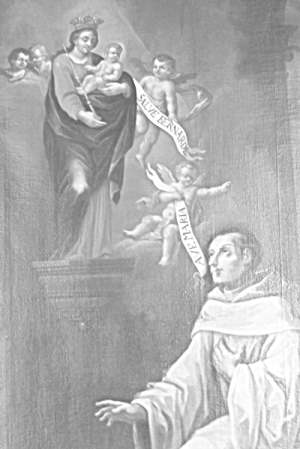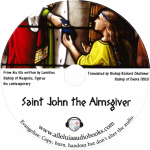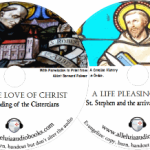Saint Bernard the Wonderworker : Miracles at Christmastide
Click Here to Download the Entire AudioBook on St Bernard the Wonderworker.
Transcript
Shortly after, St. Bernard left Constance, with the same companions who had attended him thither, except Bishop Hermann, who gave his place to a holy priest, named Wolkemar. They passed through Zurich, Rheuifelden, Basle, and Winterthur, and arrived at Strasburg on the eve of the fourth Sunday of Advent, the 22d of December, 1146. The miracles ceased not during this memorable journey; and, to use the expression of one of his biographers, “We should fear not to say enough if we only mentioned some of his miracles ; and to tell less than the truth if we related a great many. When he was preaching at Strassburg and tie other German cities, it is a wonderful fact that, though he only spoke in Latin or in the Frank Ianguage, he was understood by all, and his words moved even those who knew no other tongue than German.” The monk Godfrey says that these persons heard him with so much the more affection, as they were moved and touched by the very power of his words far more than by the interpretation of a learned man, who explained his discourses. They proved this by the compunction with which they struck their breasts and shed tears.
Meanwhile, the day of our Lord’s nativity drew near ; and the emperor had chosen that festival to hold a general diet in the city of Spires. St. Bernard had promised to be present at the assembly. He left Strasburg the evening of Sunday, December 22d, and arrived at Spires on the following Tuesday, being the vigil of Christmas. The inhabitants of the different towns and villages stood on the banks of the river, waiting with impatience for the vessel to pass by, that they might receive the blessing of the man of God, and lay the sick at his feet. All had their share in the wonderful grace which God attached to every word and action of His servant.
His entrance into the imperial city of Spires has been described by a number of contemporary chroniclers. “The bishop, the clergy, and the citizens came to meet him with great solemnity, with crosses and banners ; and the members of the various guilds, carrying the badges of their profession. He was conducted through the city, amid the sound of bells and sacred hymns, to the door of the cathedral, where the emperor and the German princes received him with all the honor due to the Pope’s envoy. There was an immense crowd of people, some of whom had come from a great distance, to see and hear the saint, and to behold the countenance of the wonder-worker. The procession advanced from the great door of the cathedral to the choir, chanting joyfully the hymn to the Queen of Heaven, * Salve Reginae St Bernard, conducted by the emperor himself, walked in the middle of the procession, surrounded by crowds of people, and deeply moved on beholding the interior of the majestic basilica ; but when the last accents of the hymn to the Virgin had died away through the sacred aisles, after these words, ‘ FUium tuum nobis post hoc exilium ostende P the holy abbot, transported by his en-thusiasm, added a threefold aspiration, ‘ O clemens! O pia! O dulcis Virgo Maria!
These sweet and tender words, which flowed spontaneously from St. Bernard’s heart, were thenceforth added to the hymn “Salve Reginae” and completed its sublime poetry. They are still sung in all Catholic churches, at the appointed seasons; but, in the Cathedral of Spires, the “Salve Reginae” is solemnly chanted every day in the year, in honor of St. Bernard; and this custom still exists. Plates of brass were laid down in the pavement of the church, to mark the footsteps of the man of God to posterity, and the places where he so touchingly implored the clemency, the mercy, and the sweetness of the Blessed Virgin Mary.
The miracles were less numerous Spires, “because,” said one of the companions of his journey, ” the multitude of the curious was too great, and the glory of God does not manifest itself in favor of curiosity.” The assembly at the diet was very large. The greater number of the bishops and princes met together to discuss the affairs of the empire; and in this august assembly the ceremony of the emperor’s coronation increased the splendor of the religious solemnity. But St. Bernard was deeply concerned at the dispositions of these great personages. Their irreconcilable animosities rendered them deaf to any overtures of peace ; and the servant of God vainly endeavored to allay their mutual grievances, and to make their personal interests give way to the cause of the Holy Sepulchre. But neither the miracles by which he proved that his mission was divine, nor the ardent and apostolic remonstrances which he addressed to the prince and to the monarch himself, could overcome their lack of will. King Conrad, however, appeared to be more moved than the rest; and two days after Christmas, on the feast of St. John the Evangelist, after he had been urgently pressed by the Abbot of Clairvaux, he announced that he would deliberate on the matter in his council, and that, on the following day, he would give a definitive reply.
This was a critical moment. An incalculable number of events depended on the emperor’s resolution. Bernard, however, did not wait until the next day. He was celebrating the Holy Sacrifice, in the presence of the court and a great number of the faithful, when, yielding to one of those inspirations which had so often produced great effects, he turned towards the people, and pronounced an impassioned discourse on the woes of the Holy Land. In the midst of his oration, he addressed himself directly to the emperor; he spoke to him, not as to a sovereign, but as to a simple Individual; he reminded him of the gifts he had received, and of the graces which had been vouchsafed to him; he reproached him with his ingratitude; and, full of Divine inspiration, he cried out, in a voice of thunder, “O man what wilt thou answer in the day of judgment?” . Conrad, struck with terror, and pierced, as it were, even to the marrow of his bones, interrupted the preacher, and demanded the cross of Christ. ” I acknowledge,” he said, with tears, ” that God has given me many graces ; and, with the help of the Lord, I will not render myself unworthy of them.” And he added, ” I am ready to devote my life to the Lord, and to go whithersoever he calls me” The people, deeply moved, and astonished at this extraordinary scene, raised their hands to heaven, and filled the basilica with prolonged acclamations; the whole city was in a state of excitement and commotion; and the earth reechoed, afar off, the people’s cries of joy and enthusiasm.
Meanwhile, the humble St. Bernard remained profoundly recollected after this miracle of miracles, and taking the sacred banner from the altar, he placed it in the emperor’s hands, and adorned him with the glorious symbol of the God of hosts. At the same moment, all the princes, with one simultaneous impulse, knelt at the feet of the holy preacher, and asked for the pilgrim’s cross. Foremost amongst them was the young Frederic of Suabia, the emperor’s nephew, and the heir to the throne, afterwards so famous under the title of Barbarossa. He took the cross, in spite of the tears and entreaties of his aged father. The barons and knights eagerly followed the example of their lords. And not only the grandees, but the people were desirous to receive the cross from St. Bernard’s hands. No obstacle, no consideration could resist this unanimous impulse ; the great interest of the Crusade had absorbed all other interests and feelings. Men differing in age, rank, education, and descent, united together in the same cause, and enrolled themselves under the same standard ; and the diet which had been convoked to remedy the wrongs of Germany, was now only occupied in discussing the fate of Jerusalem. This sudden change was looked upon by all as the miracle of miracles. Hope revived in every heart ; and all, forgetting their past dissensions, roused themselves from their lethargy, to begin a new life, and taste the consolations of religion. ” Wonderful to tell,” says a contemporary chronicler, ” robbers and brigands came together from all parts to do penance, and vowed that they would shed their blood for Christ I” ” Every reasonable man,” adds the historian, “who witnessed the changes wrought in them, beheld the finger of God, and was not the less astonished I” Oh, who shall work such a desired revolution at the present time? Who shall unite us all in one common work? Who shall reveal unto us the idea, the sentiment, which can break the bonds of egotism, enlarging the mind and kindling in the heart of man the fire of a living and life-giving faith?
Download MP3 of St Bernard the Wonder Worker: Miracles at Christmastide (Right Click and Select Save As)
Click Here to Go Back To the AudioBook Page
Click here to make a novena to St Bernard
Credits
Saint Bernard the wonder worker, excerpts from the Life and Times of Saint Bernard by Abbot Theodore Ratisbonne and Heroic Virtue: A Portion of the Treatise of Benedict XIV on the Beatification and Canonization of the Servants of God Volume III.
Image is used and modified with Attribution License
You may also like:
- Saint Bernard the Wonderworker: Part 4 The Crusades and St Bernard
- Saint Bernard the Wonderworker: Part 3 More Miracles in Milan
- Saint Bernard the Wonderworker: Part 2 The Labors of Saint Bernard in Milan
- Saint Bernard the Wonderworker: Part 1 Early Miracles of St Bernard.
- Catholic Audiobook: St. Bernard the Wonderworker
- Catholic Audiobook: The Betrayel Of Judas and The Denial of Peter
- Catholic Audiobook: St. Thomas Aquinas for Lent







Pingback: augustinus Josef tio
Pingback: Noah Moerbeek
Pingback: augustinus Josef tio